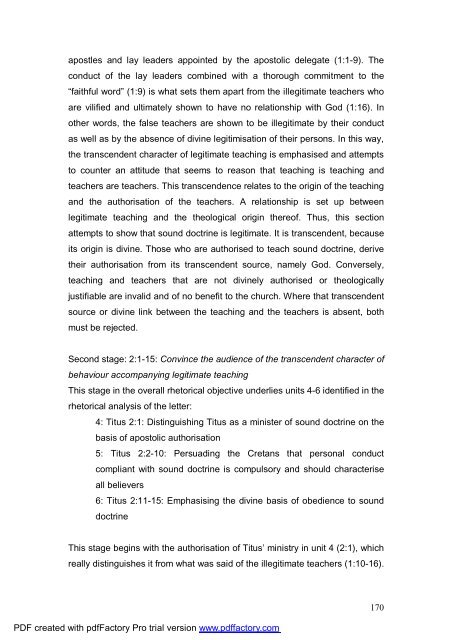A Text centred rhetorical analysis of Paul's Letter to Titus
A Text centred rhetorical analysis of Paul's Letter to Titus
A Text centred rhetorical analysis of Paul's Letter to Titus
Create successful ePaper yourself
Turn your PDF publications into a flip-book with our unique Google optimized e-Paper software.
apostles and lay leaders appointed by the apos<strong>to</strong>lic delegate (1:1-9). The<br />
conduct <strong>of</strong> the lay leaders combined with a thorough commitment <strong>to</strong> the<br />
“faithful word” (1:9) is what sets them apart from the illegitimate teachers who<br />
are vilified and ultimately shown <strong>to</strong> have no relationship with God (1:16). In<br />
other words, the false teachers are shown <strong>to</strong> be illegitimate by their conduct<br />
as well as by the absence <strong>of</strong> divine legitimisation <strong>of</strong> their persons. In this way,<br />
the transcendent character <strong>of</strong> legitimate teaching is emphasised and attempts<br />
<strong>to</strong> counter an attitude that seems <strong>to</strong> reason that teaching is teaching and<br />
teachers are teachers. This transcendence relates <strong>to</strong> the origin <strong>of</strong> the teaching<br />
and the authorisation <strong>of</strong> the teachers. A relationship is set up between<br />
legitimate teaching and the theological origin there<strong>of</strong>. Thus, this section<br />
attempts <strong>to</strong> show that sound doctrine is legitimate. It is transcendent, because<br />
its origin is divine. Those who are authorised <strong>to</strong> teach sound doctrine, derive<br />
their authorisation from its transcendent source, namely God. Conversely,<br />
teaching and teachers that are not divinely authorised or theologically<br />
justifiable are invalid and <strong>of</strong> no benefit <strong>to</strong> the church. Where that transcendent<br />
source or divine link between the teaching and the teachers is absent, both<br />
must be rejected.<br />
Second stage: 2:1-15: Convince the audience <strong>of</strong> the transcendent character <strong>of</strong><br />
behaviour accompanying legitimate teaching<br />
This stage in the overall <strong>rhe<strong>to</strong>rical</strong> objective underlies units 4-6 identified in the<br />
<strong>rhe<strong>to</strong>rical</strong> <strong>analysis</strong> <strong>of</strong> the letter:<br />
4: <strong>Titus</strong> 2:1: Distinguishing <strong>Titus</strong> as a minister <strong>of</strong> sound doctrine on the<br />
basis <strong>of</strong> apos<strong>to</strong>lic authorisation<br />
5: <strong>Titus</strong> 2:2-10: Persuading the Cretans that personal conduct<br />
compliant with sound doctrine is compulsory and should characterise<br />
all believers<br />
6: <strong>Titus</strong> 2:11-15: Emphasising the divine basis <strong>of</strong> obedience <strong>to</strong> sound<br />
doctrine<br />
This stage begins with the authorisation <strong>of</strong> <strong>Titus</strong>’ ministry in unit 4 (2:1), which<br />
really distinguishes it from what was said <strong>of</strong> the illegitimate teachers (1:10-16).<br />
PDF created with pdfFac<strong>to</strong>ry Pro trial version www.pdffac<strong>to</strong>ry.com<br />
170

















